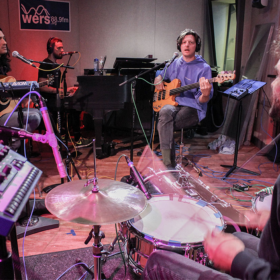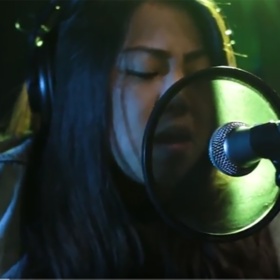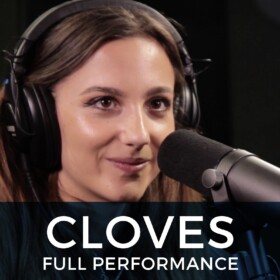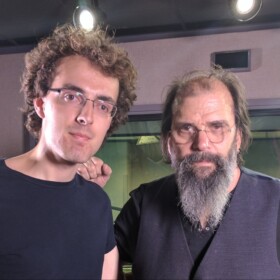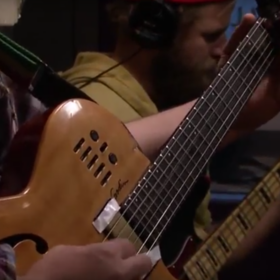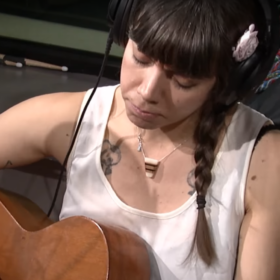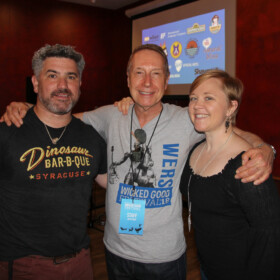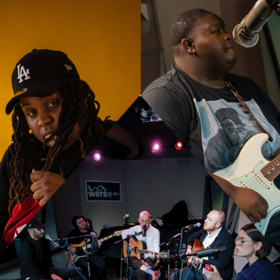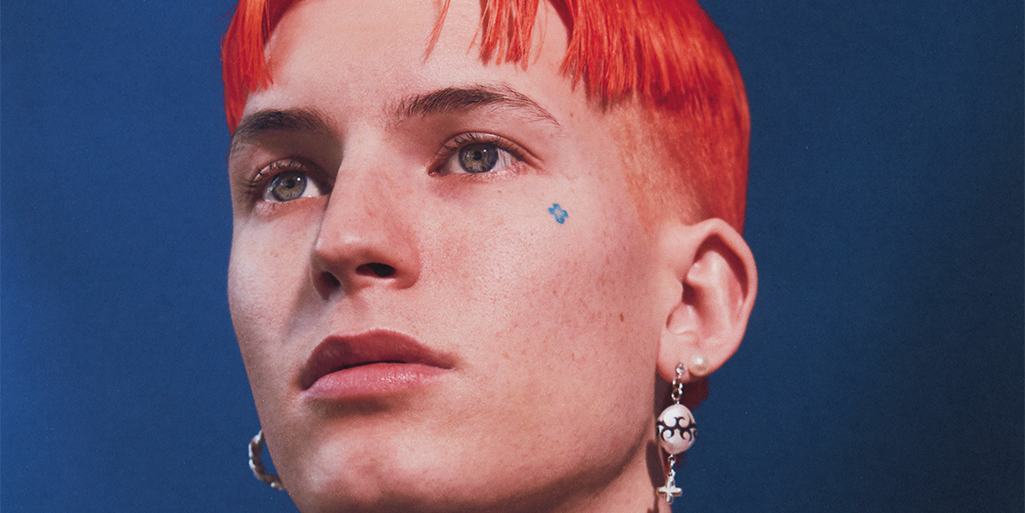

Photography by Jess Farran
By Lily Doolin, WERS Blog Editor
The first time singer/songwriter Gus Dapperton heard himself on the radio, he was in the eighth grade and had won a songwriting contest. The next time he heard his music on the radio, Dapperton was in the throes of building an impressive music career based on his refusal to stick to one genre. Trying to put a label on Dapperton's music is almost impossible, and that's his intention. Dapperton talked about the diversity in his sound, as well as his inspiration for the visual and lyrical aspects of his work, with WERS Blog Editor Lily Doolin.
What I personally love - and what we at the station love most about your music - is your sound. In addition to your incredible lyricism, you have this unique blend of sounds, and I was wondering what inspires you not just lyrically, but also sonically to create this kind of music?
Gus Dapperton: Basically, when I started growing up, I was making a lot of hip-hop music and hip-hop beats. I think everyone thinks that there's this genre of music that's cool to them, and when I was in middle school and early high school, I thought only boom bap, old school hip-hop was cool, and nothing else was cool. I used to listen to a lot of indie alternative music, and even before that basic pop music. I had this weird phase where me and my friends were all skaters, and I thought that the only cool music was boom-bap hip-hop music. Then, when I decided to start composing my own stuff and songwriting, I was inspired by guitar players and singers, I realized that the coolest thing to do was not to neglect any genre of music. I basically embraced [all genres] and said, "Fuck it," and would listen to anything that I thought was a good song.
I think there's not one particular genre that carries the best songs. I think the best songs are an even mix between country, pop, hip-hop, alternative, folk, rock, whatever. I think the best songs live in each genre, and I just wanted to make the best songs I could make, so I just didn't neglect anything. I listened to everything. It's not like I'm striving to sound like anything in particular, I'm striving to not sound like anything in particular.
You mentioned your initial interest in boom-bap and similar genres. I'm interested in what started your musical journey. What motivated you to kick off this project?
GD: I guess when you're growing up, you're encouraged to do things that you're good at, and so my sister was a really good singer, so she was encouraged to be a singer, and I was good at sports and stuff, and also I was a good artist - a good painter and drawer - so I was encouraged to do those things, but I wasn't necessarily encouraged to try new things. I think a lot of kids aren't necessarily encouraged to try new things, because you do something when you're young and you're good at that, and it's almost like, "Why would you want to start something new?"
We got prompted to do this songwriting competition in eighth-grade music class, and everyone was forced to sing and produce their own song - or not sing, but produce vocals in their own song - and produce it and make it, which is super nerve-wracking. Even if you're a good singer in eighth grade, when I was fourteen, I don't think anyone is confident in how their voice sounds, and you're going through puberty and your voice doesn't sound great and it's really nerve-wracking. But I took it really seriously, I was like, "Man, I can do this, I can win the competition," because the winner got to go on the town radio station. There was this new MacBook lab, there were like eight MacBooks - we got this new computer lab in middle school - and we would all go and use Garage Band and use loops. So, I basically studied all of these producers that I liked, all of these artists that I liked, and I went in and made the song, and I ended up winning the contest, and I was on the radio and they played it on the announcements. And I was like, "Oh, I want to do this for the rest of my life," and I took it really seriously, started doing it. I mostly was producing, then I started singing when I was seventeen and was like, "Yeah, I'm just gonna try doing this for the rest of my life."
That's quite the origin story, I love it (laughs). Moving from the sonics and lyricism of your work, I also really appreciate the visuals that you add to your music, from cover art to music videos. What's the inspiration behind the look and feel of your project?
GD: I definitely wanted to have a cohesive sound, as well as a cohesive artistic vision for the music, so I guess I understood the need for art to be cohesive, and after that understood the need for the visuals to be cohesive, not necessarily for all of it to have a similar style, but I was like, "If I'm putting a hundred percent into the music, and I'm an artist that's going to be appearing in all these different ways, then I want to put a hundred percent into all these different aspects." I used to film and edit when I was a kid and make funny videos with my friends and make skate videos, I used to paint and draw and stuff, so I just kind of understood the need to put a hundred percent into all of it, and now I pretty much consider myself - the music is first and foremost, but I also consider myself a multi-media artist. I think all of it is important.
Combining all of that together, as you're evolving from your debut album Where Polly People Go to Read, where do you see yourself going next? What do you want the next phase of Gus Dapperton to look like, both in visuals and in sound?
GD: I'm pretty much just reflecting on more real issues and deeper feelings to me, like pain and depression and suicidal thoughts and things, things that I've felt that I've never reflected on, like resentment towards my youth and all this stuff. I usually used to write about love because that's what inspired me, I was always a hopeless romantic, just falling in love with everyone I met. I loved writing about that, but then I was going through these changes and touring all the time with my band and we were going through all of these emotional roller-coasters, really emotional highs and really emotional lows, and I just wanted to reflect on life in that respect, and life and death and weighing the two and what they mean.
Looking at the debut album, as well as all of the collaborations you've got going on that have been skyrocketing in popularity, if you looked at all of the music you've released so far, what would you say is a song that has either taught you something about yourself or your musical process?
GD: Maybe "Post Humorous," the newest one that came out. I think my whole life combined is summed up in that song for me, feeling wise. Everything else is a lot of glimpses of my life, and I think "Post Humorous" sums everything up, sums up my music, and sums up my sound, and everything.
Considering the excitement around "Post Humorous" and the growing base of followers you have, what are you - at a base level - just really excited about what's next for you?
GD: I'm really excited to release this upcoming album, really excited. I could say that about every new album that I make, but I definitely think I reached something I didn't see myself reaching in a place that I didn't see myself going, and it's a good surprise to myself, and I'm proud of it.



